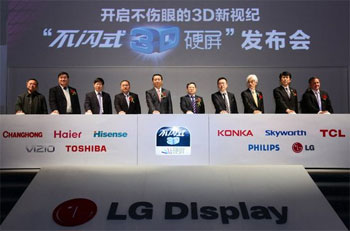Although active-shutter models still dominate the 3D TV landscape in China, “passive” sets that use polarized 3D glasses have been gaining in popularity among consumers over the Chinese New Year holiday sales period, the latest data from iSuppli has revealed. According to the California-headquartered market research firm, passive 3D TVs actually grew faster in sales compared to their ASG (active-shutter glasses) counterparts which admittedly accounted for the majority of 3D televisions sold in the country.

In December last year, LG Display joined forces with several Chinese HDTV manufacturers such as Haier, Konka, Skyworth, Changhong, Hisense and TCL to launch a concerted assault on China’s 3DTV market. The ace up LG’s sleeve is its FPR (film-type patterned retarder) polarized 3D LCD technology, which the Korean conglomerate says will deliver a flicker-free three-dimensional viewing experience, hence reducing eye fatigue. Besides being less expensive to manufacture (and therefore easier on buyers’ wallets), 3D LCD TV sets equipped with FPR technology also use polarized glasses that are typically cheaper, lighter and more comfortable to wear than active-shutter variants.
Last month, LG Display announced that its FPR 3D TV models have got off to a good start in China – selling over 100,000 units in under two months despite minimal marketing – and iSuppli’s most recent report certainly lends credence to LG’s claim. Even more encouraging is that Chinese TV makers and retailers are enthusiastic about the passive 3D technology: sales of local TV brands outpaced foreign ones during the Lunar New Year season, even though non-Chinese brands are still leading the 3-dimensional television market.
On the whole, take-up of 3D TVs – be them LCD or plasma-based – remained sluggish among Chinese households: only around 2% of the TVs sold over the festive period featured 3D capabilities. From a larger perspective, China’s television sales during the Chinese New Year 2011 also failed to meet expectations. iSuppli blamed year-long discounted deals and the dwindling influence of the government’s rural subsidy programme for dampening the sales-boosting effect of the holiday.
